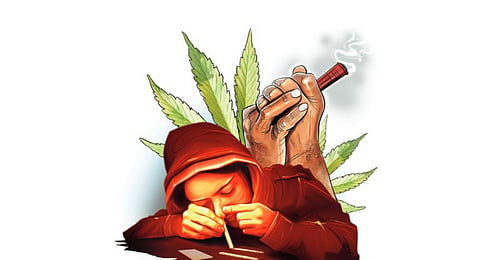

THIRUVANANTHAPURAM: It is no secret that Kerala has been grappling with drug menace at an unprecedented scale. Even children as young as 12 are getting addicted to cannabis and synthetic drugs, according to experts. While laxity in enforcement is often panned, what’s more shocking is the shoddy administration of the state-run de-addiction programme, Vimukthi Mission.
Sample this: Ernakulam district currently lacks a functioning government de-addiction centre. The Vimukthi de-addiction centre in Muvattupuzha has remained defunct since April 19, as the staff vacancies have not been filled.
The situation is dire because Muvattupuzha is the only Vimukthi de-addiction centre in the district. It can treat 10 in-patients at a time, while around 15 patients used to appear for outpatient facilities daily.
“This centre was one of the best-run facilities in the state. Now, it has only nursing staff. Without a doctor, it has remained closed for months,” says a Vimukthi official. “We now refer patients to centres in Chalakudy and Idukki.”
Another major concern is the rise in the number of relapse cases due to the periodic shuffling of doctors. “Unlike physical ailments, psychiatric treatment requires trust and rapport between the patient and the doctor,” the official adds.
“If the staff and doctor are relieved every three years, as per the policy, it will severely affect the patients. Even now, patients reach us looking for the earlier doctor. Even if a new doctor is appointed, we need to start working from the ground up, from the basics.”
Currently, as per the policy, doctors have to be hired through the employment exchange. However, not many professionals are registered under it. “And those who are registered are reluctant to work in this position, as they can easily get high-paying jobs in the private sector,” the official notes.
“So far, the department has called for filling the position twice. If a doctor rejects the position for the third time, it will have to be filled internally.”
It’s a similar state of affairs in Vikumkthi’s south-zone counselling centre in Thiruvananthapuram. The counselling centres are divided among three zones under Vimukthi – Thiruvananthapuram, Ernakulam, and Kozhikode.
Each of these centres is supposed to have two counsellors. While Kochi centre has two counsellors, Kozhikode only has one, and the state capital has none.
“Experienced counsellors are vital in battling addiction. It is appalling that the vacancies in the state capital are yet to be filled,” the official says.
Rising number of teenage cases
According to Honey Mol K K, a counsellor at Vimukthi Counselling Centre in Ernakulam, drug abuse is the primary problem among youth. “We handle drug and alcohol addiction along with other mental health issues. However, most cases, of late, have been drug-related, the majority of them under the age of 25,” she says.
Since 2018, the centre has treated nearly 500 minors and over 600 under the age of 21. From the age of 12, children can show a tendency for addiction, notes Honey. “It starts with cigarettes mostly. Then they graduate to cannabis, and later synthetic drugs. Older teens are getting addicted to methamphetamine,” she adds.
In most cases, according to her, it is the teachers who initially spot addiction in children. “Parents come to know about it only much later. Teachers refer the children to us, and we take the case forward. If the patient is facing severe withdrawals, we refer them to de-addiction centres,” says Honey.
“When it comes to drug addiction, inpatient treatment for affected patients requires at least 21 to 30 days, followed by sustained counselling. There are also chances of relapse as the patient returns to the same environment. That is why follow up counselling is important.”
Vignesh Viswanath, coordinator of Vimukthi Mission in Thiruvananthapuram, says the district has a de-addiction centre with a capacity of 10 beds, and a separate 10-bed wing for women and children. “Patients with severe addiction are referred to hospitals or the medical college for specialised treatment,” he says.
Vignesh is clearly worried as he points out that the difficulty in detecting what lures youngsters into drugs. “Unlike cigarettes or alcohol, synthetic drugs do not stink,” he says.
“The de-addiction centres here handle at least 70 cases a month,” he says. Children and youngsters make up most of the patients. Teenagers around the age of 15 start using drugs.
“Along with cannabis, alcohol, and opioids, some also steal and consume psychiatric medicines from their parents. We have had cases where some were hooked to sniffing paint and industrial glue. Drug abuse is certainly rising in Thiruvananthapuram. It’s not just boys; even schoolgirls are falling prey to the menace.”